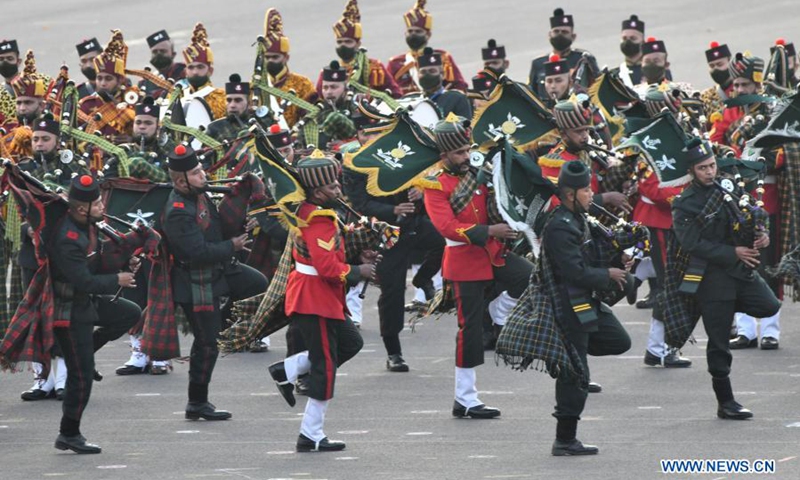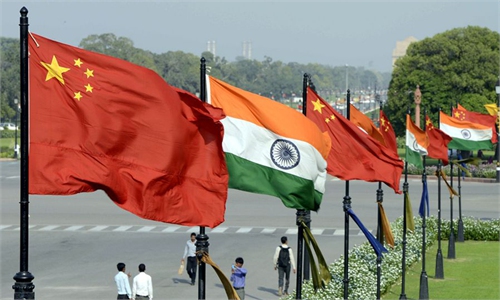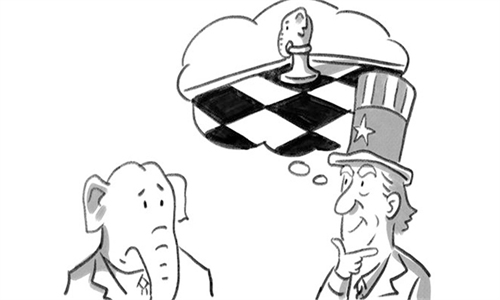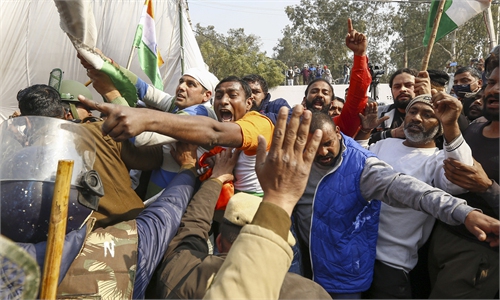Buying weaponry won't help India's military modernization with modest rise of defense budget: expert

The beating retreat ceremony is held at Raisina Hills, marking the end of the Republic Day parade, in New Delhi, India, on Jan. 29, 2021.Photo:Xinhua
Heavily affected by the COVID-19 pandemic, India's economy is estimated to report its worst-ever contraction of 7.7 percent in 2020-21, leading to a modest increase of the defense budget - and the additional spending will reportedly be to buy new military hardware following several standoffs with China.
However, Chinese experts said that by buying weapons from other countries, India won't gain the military advantage it longs for in dealing with border issues with China.
They also noted that if India insists in blindly satisfying its vanity on the military when its economy cannot afford it, this will affect its economic reforms and lead to a vicious circle.
Indian's military spending rose to 3.47 trillion rupees ($47.4 billion), up from 3.43 trillion rupees in the previous financial year, budget documents indicated, Bloomberg reported on Monday. It also noted that India's expenditure is about one-quarter of China's: In May 2020, Beijing announced a yearly defense budget of $178.6 billion.
The small budget rise contradicts previous expectations in India for "robust" or "hiked" spending on the military, considering the series of standoffs with China along the border, Indian media reported. They also noted that the modest rise would be used to buy new military hardware to "urgently plug gaps."
India's economy has suffered from an astonishing decline due to the COVID-19 pandemic and under these circumstances, it cannot put more money into the military, Song Zhongping, a Chinese military expert and commentator, told the Global Times on Tuesday.
India's economy is set for its biggest annual contraction since records began in 1952 amid a rapid rise of coronavirus cases. Its GDP will shrink 7.7 percent in the financial year ending in March, the Indian statistics ministry said in its first advance estimate published in January, the Times of India reported.
India's defense budgets have witnessed a steady rise in recent years with the increase of its national comprehensive strength. This year's small increase comes along with great financial pressure. But it is an illusion to believe that it can improve its military capability by buying weapons from other countries, Qian Feng, director of the research department at the National Strategy Institute at Tsinghua University, told the Global Times.
Due to its low capacity for research and development, India is seeking to buy advanced and high-tech weaponry globally, which makes it hard to gain the advantage it has longed for when facing China, especially in prolonged, large-scale and intensive standoffs, Qian said.
The year of 2020 witnessed several standoffs and a skirmish between China and India. While the two sides are pushing for corps commander-level meetings, India has deployed more troops in the border areas.
India has bought weaponry from the US, Russia, Israel and France recently, which would only offer a limited increase of its combat capability. Logistics and supplies for the military are the key to a battle. The military's fighting capability would be affected if its weaponry is damaged and there are no replacements, Song noted.
Maintenance costs would also be huge and much money will be spent pointlessly when it is hastily buying weaponry for a short-term capability increase, Song said, noting this shortcut may jeopardize India's way of improving its national defense.
India has also made efforts in infrastructure construction in border areas, including building roads to fix its disadvantages. But if it cannot manage to accomplish these projects, these will remain the soft underbelly, Song said.
Aside from trying to "modernize" its military hardware, India's defense budget will also be spent on its largest-ever military reforms. "Whether it would succeed remains to be seen, given many problems," Qian said.
If India still insists in realizing the "modernization" of its military by buying weaponry without considering the cost, its economic reform won't be smooth and may lead to a vicious circle, the expert said.




